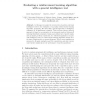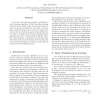494 search results - page 1 / 99 » Evaluating a Reinforcement Learning Algorithm with a General... |
133
Voted
CAEPIA
2011
Springer
14 years 2 months ago
2011
Springer
In this paper we apply the recent notion of anytime universal intelligence tests to the evaluation of a popular reinforcement learning algorithm, Q-learning. We show that a general...
114
click to vote
ATAL
2009
Springer
15 years 8 months ago
2009
Springer
Improving the sample efficiency of reinforcement learning algorithms to scale up to larger and more realistic domains is a current research challenge in machine learning. Model-ba...
165
click to vote
ICTAI
2003
IEEE
15 years 7 months ago
2003
IEEE
One of the very interesting properties of Reinforcement Learning algorithms is that they allow learning without prior knowledge of the environment. However, when the agents use al...
ATAL
2009
Springer
15 years 8 months ago
2009
Springer
Reinforcement learning algorithms that use eligibility traces, such as Sarsa(λ), have been empirically shown to be effective in learning good estimated-state-based policies in pa...
149
click to vote
ATAL
2007
Springer
15 years 6 months ago
2007
Springer
The dominant existing routing strategies employed in peerto-peer(P2P) based information retrieval(IR) systems are similarity-based approaches. In these approaches, agents depend o...


